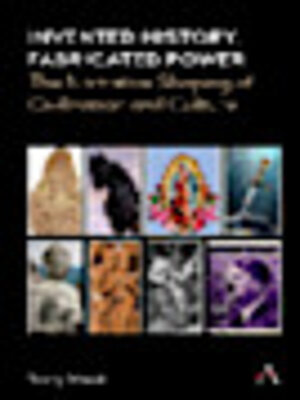Invented History, Fabricated Power
ebook ∣ The Narrative Shaping of Civilization and Culture
By Barry Wood

Sign up to save your library
With an OverDrive account, you can save your favorite libraries for at-a-glance information about availability. Find out more about OverDrive accounts.
Find this title in Libby, the library reading app by OverDrive.



Search for a digital library with this title
Title found at these libraries:
| Library Name | Distance |
|---|---|
| Loading... |
Invented History, Fabricated Power begins with an examination of prehistoric beliefs (in spirits, souls, mana, orenda) that provided personal explanation and power through ritual and shamanism among tribal peoples. On this foundation, spiritual power evolved into various kinds of divine sanction for kings and emperors (Sumerian, Egyptian, Greek, Roman, Indian, Chinese and Japanese). As kingships expanded into empires, fictional histories and millennia-long genealogies developed that portrayed imperial superiority and greatness. Supernatural events and miracles were attached to religious founders (Hebrew, Hindu, Buddhist, Christian, Islamic). A unique variation developed in the Roman Church which fabricated papal power through forgeries in the first millennium CE and the later "doctrine of discovery" which authorized European domination and conquest around the world during the Age of Exploration. Elaborate fabrications continued with epic histories and literary cycles from the Persians, Ethiopians, Franks, British, Portuguese, and Iroquois Indians. Both Marxists and Nazis created doctrinal texts which passed for economic or political explanations but were in fact self-aggrandizing narratives that eventually collapsed. The book ends with the idealistic goals of the current liberal democratic way of life, pointing to its limitations as a sustaining narrative, along with numerous problems threatening its viability over the long term.
|Typically we think of power as economic, political, or military, but fictional narratives attached to kings, empires, religious founders, and societies have been used to create and enhance power and authority since the beginning of civilization. Invented History, Fabricated Power presents evidence from cultures ancient and modern, Eastern and Western, to demonstrate that narrative extends well beyond literary works (plays, poems, epics, novels) where it is usually studied by literary specialists. At the same time, there is much to be learned about the power of narrative from literary analyses which are herein undertaken for a number of lesser known works: Ramayana, Mahabharata, Shahnameh, Sejarah Melayu, Negarakertagama and Kebra Nagast. As an imaginative endowment of humans, however, "narrative knowing" is a cognitive universal—the primary way we organize, remember, and communicate our experience and knowledge. It is, thus, a faculty susceptible to narratives that construct and enhance power for persons, kings, empires, societies, religions, and cultures.
The result of the book is a survey of narrative power in familiar Western cultures (Greek, Roman, Frankish, British), less familiar Asian cultures (Chinese, Indian, Japanese), and a number of lesser known cultures typically bypassed by historians (Persian, Ethiopian, Iroquois, Malaysian, Aztec). It also seems important to take a hard look at the Roman Church where a series of forgeries established papal power that persisted long after the forgeries were exposed. It also seems important to recognize that the Marxist economic analysis included an unlikely futuristic scenario that was corrupted by revolution and eventually failed. The astonishing Nazi ideology promulgated by Adolf Hitler was founded on fictional analyses of both "Aryans" and Jews but nevertheless inspired "willing executioners" to carry through the "final solution" of the Holocaust.
Eventually we consider our own consuming ideology, most notably the idealistic narrative of liberal democracy now available to only a fraction of the world population. We have come to recognize it is propped up by a desire for control, comfort, and consumption—a way of life that now endangers human survival as...







